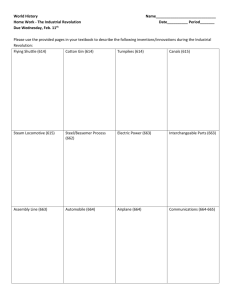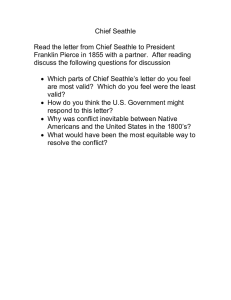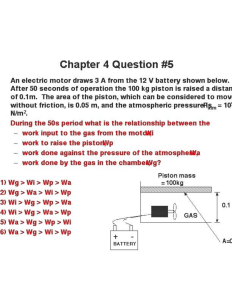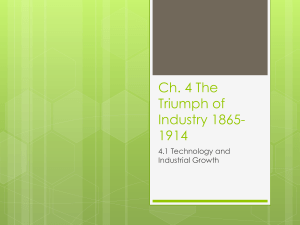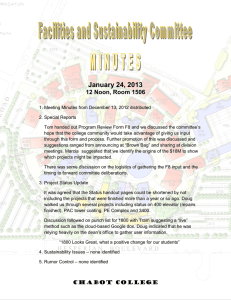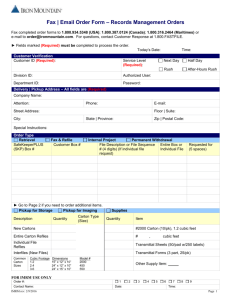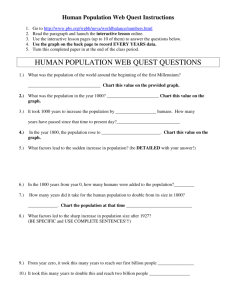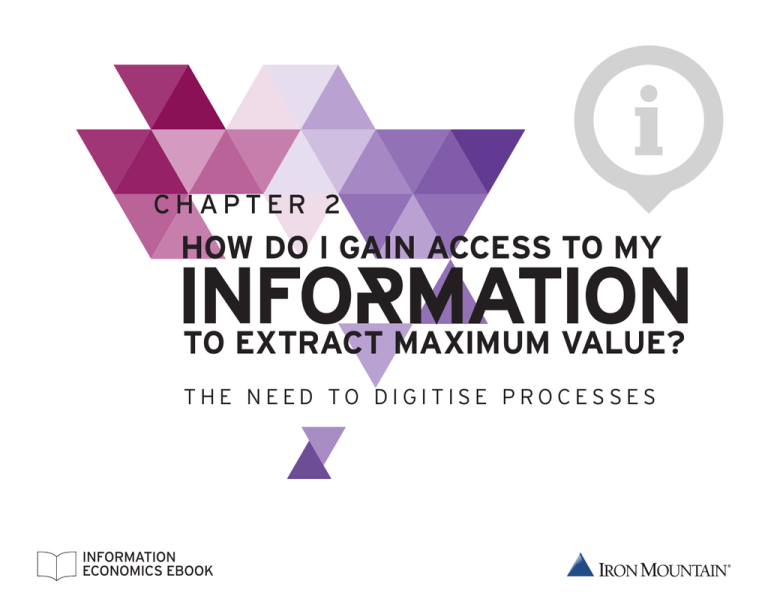
CHAPTER 2
HOW DO I GAIN ACCESS TO MY
INFORMATION
TO EXTRACT MAXIMUM VALUE?
THE NEED TO DIGITISE PROCESSES
INFORMATION
ECONOMICS EBOOK
W H Y YO U N EED
T H E I N F O R M AT I O N
ECONOMIC S EBOOK
This five-part eBook will help you gain a full understanding
of the role information plays in your organisation.
It examines every aspect of Information Economics.
1. What is Return on Information?
2. How do I gain access to my information to extract maximum value?
Barriers to value extraction
Positive policies
YOU WILL LEARN
3. What is the cost of ignoring information risk?
4. How can I design a programme that works for our people and our business?
5. How will future trends in information management affect my business?
UK-RM-EXT-240215-001 How to take full
advantage of one of
your most valuable
assets and how to
minimise the costs
and risks connected
to your records and
information
R.O.I 1800 732 673 | N.I. 08445 60 70 80 | ironmountain.ie
08445 60 70 80 | ironmountain.co.uk
2
SEE INFORMATION
DIFFERENTLY
I N F O R M AT I O N
ECONOMIC S
T H E I N T E R S EC T I O N O F VA L U E , R I S K A N D C O S T
Information Economics is managing and leveraging information created and received by an
organisation with a view to the bottom line. Every business needs an enterprise-wide information
strategy that aims to reduce risk, ensure compliance, lower costs, and now with the emergence of
big data, prepare for analytics. Information Economics provides a comprehensive and collaborative
strategy to help organisations optimise information value and limit risk at every stage from the initial
creation of records and information across their active life, right through to secure destruction.
UK-RM-EXT-240215-001 R.O.I 1800 732 673 | N.I. 08445 60 70 80 | ironmountain.ie
08445 60 70 80 | ironmountain.co.uk
3
CHAPTER 2:
DIGITISING
I N F O R M AT I O N
TO EXTRACT
M A X I M U M VA L U E
Information is essential to business, and getting a
Return on Information is essential to business strategy.
Extracting maximum value means getting the right
information to the right place fast, with minimal effort,
total accuracy and no compromise to security. Achieve
this, and you will gain competitive advantage by providing
better service to your people, and your customers.
In Chapter 1, we explored the problems connected
to the information explosion and the proliferation
of both paper and digital records. In this chapter we
examine the barriers to getting maximum value from
your information, and how digitisation can be used to
overcome them.
UK-RM-EXT-240215-001 GETTING A
RETURN ON
INFORMATION
IS ESSENTIAL
TO BUSINESS
STRATEGY
R.O.I 1800 732 673 | N.I. 08445 60 70 80 | ironmountain.ie
08445 60 70 80 | ironmountain.co.uk
4
BARRIERS TO
VA L U E E X T R AC T I O N
PAPER IS THE PROBLEM
The well-documented 20th century vision
of the paperless office has failed to materialise.
More than half of companies still receive the
majority of their customer enquiries on paper1.
If a customer or salesperson makes an enquiry,
and a document is missing, it’s easy to imagine
the resulting loss of revenue.
PAPER
IS SLOW
TO MOVE,
EASY TO LOSE
AND HARD TO
CONTROL
Research in 2014 revealed what consumers
dislike most about customer service. Of those
questioned, 77% claimed to have been redirected
internally with unactioned requests while 25%
had experienced the person they were speaking
to being unable to access their details2. Document
storage and access is a major cause of such
problems. Paper is slow to move, easy to lose
and hard to control. The value of the information
held solely in paper records can be difficult to
extract efficiently.
1, 2
Paper Light research, Opinion Matters, 2014
UK-RM-EXT-240215-001 R.O.I 1800 732 673 | N.I. 08445 60 70 80 | ironmountain.ie
08445 60 70 80 | ironmountain.co.uk
5
BARRIERS TO
VA L U E E X T R AC T I O N
TRAIN OR REMAIN THE SAME
The opportunity here, lies with people and
their practices. Training and education can
help people understand the relationship between
information management and profit and loss.
Amazingly, only 26% of companies have training
programmes on information risk3.
Procedures, if in place, are all too often
misunderstood and even ignored. Although 80%
of companies have formal policies, 64% lack
companywide adoption4. Among companies that
implement paper-free processes the biggest single
difficulty is re-orienting staff5.
ONLY 26%
OF COMPANIES HAVE
TRAINING PROGRAMMES
ON INFORMATION
RISK ISSUES
3, 4
5
P
wC and Iron Mountain, Beyond Good Intentions - The need to move from
intention to action to manage information risk in the mid-market, June 2014
AIIM Market Intelligence, Paper Wars 2014
UK-RM-EXT-240215-001 R.O.I 1800 732 673 | N.I. 08445 60 70 80 | ironmountain.ie
08445 60 70 80 | ironmountain.co.uk
6
POSITIVE
ACTIONS
POSITIVE POLICIES
In order to extract maximum value and ensure
you get a positive Return on Information,
company-wide policies and procedures need
to be applied. These should regulate document
destruction and retention, authorised access,
secure storage, removal and digitisation. Policies
link strategic direction to day-to-day operations.
Well defined policies and processes enable you
to guide and govern information management
in your organisation.
PAPER TO DIGITAL
Archived records can be scanned, but
scanning every record is costly and inefficient.
A pay-as-you-go model is usually the most cost
effective. This lets you scan the documents
you need frequently for immediate use. Other
documents you access rarely can be scanned
on demand.
PAY-AS-YOU-GO
SCANNING IS THE MOST COST EFFECTIVE
UK-RM-EXT-240215-001 R.O.I 1800 732 673 | N.I. 08445 60 70 80 | ironmountain.ie
08445 60 70 80 | ironmountain.co.uk
7
POSITIVE
ACTIONS
DOCUMENT SEARCH MADE EASY
One advantage of digitising records is
the opportunity to use metadata as tags.
This allows different people to find a particular
document using the most relevant search terms.
Huge efficiency gains can be made in this way,
as the speed at which information is moved and
used can increase the business value that is has.
Research indicates people are 26.5% more
effective when they have faster and easier
access to information6. And, when your
customer facing teams have direct access
to information, they can meet the needs
of customers more quickly.
6
PEOPLE ARE
26.5%
MORE EFFECTIVE WHEN
THEY HAVE FASTER
AND EASIER ACCESS
TO INFORMATION
Association for Information and Image Management
UK-RM-EXT-240215-001 R.O.I 1800 732 673 | N.I. 08445 60 70 80 | ironmountain.ie
08445 60 70 80 | ironmountain.co.uk
8
POSITIVE
ACTIONS
DIGITISE TO OPTIMISE
A digital mailroom, scans inbound or internally
generated documents to extract critical
information. This information is then immediately
available, from anywhere, in a digital format.
Your people will be able to deliver rapid service
to customers and share documents easily.
The original documents can be stored securely
and cost effectively offsite.
Digitising requires investment, but 2014 research
demonstrated that 60% of businesses that
implemented these techniques see a payback
within 18 months7. The same study revealed that
digital mailrooms delivered a host of benefits,
with the biggest being faster turnaround times
for customers, and improved downstream
efficiency due to higher quality data-capture8.
7, 8
PROCESSES IDEAL FOR SCANNING
CREDIT CARD
APPLICATION
FORM
Credit card
application process
HR
EMPLOYEE
FILE
Employee role change process
Disciplinary process
Employee leaving process
TECHNICAL
PRODUCT
DRAWING
Product repair process
CLAIM
FORM
Insurance claim process
e.g. health, car
or house insurance
INVOICE
/ TRAVEL
EXPENSE FORM
Accounts Payable process
COMPLAINT
FORMS
Complaint resolution process
Product recall process
AIIM Market Intelligence, Paper Wars 2014
UK-RM-EXT-240215-001 R.O.I 1800 732 673 | N.I. 08445 60 70 80 | ironmountain.ie
08445 60 70 80 | ironmountain.co.uk
9
SEE INFORMATION
DIFFERENTLY
EXTRACTING MAXIMUM VALUE
Companywide policies and procedures, as well as processes powered by digitisation, are key factors
in extracting maximum value from your information. In the next chapter, we’ll look at the costs
connected to information risk.
UK-RM-EXT-240215-001 R.O.I 1800 732 673 | N.I. 08445 60 70 80 | ironmountain.ie
08445 60 70 80 | ironmountain.co.uk
10
EXTRACT MAXIMUM
VALU´
LOOK OUT FOR THE NEXT CHAPTER
CHAPTER 3:
WHAT IS THE
COST OF IGNORING
INFORMATION RISK?
To f in d o u t m o re a b o u t th e a dva nta g es of d i g itisin g , d own l o a d
G et tin g it Ri g ht fro m th e Sta r t – th e B asic s of D i g itisin g
INFORMATION
ECONOMICS EBOOK
© 2015 Iron Mountain Incorporated. All rights reserved. Iron Mountain and the design
of the mountain are registered trademarks of Iron Mountain Incorporated in the U.S.
and other countries. All other trademarks and registered trademarks are the property
of their respective owners.
UK-RM-EXT-240215-001 R.O.I 1800 732 673 | N.I. 08445 60 70 80 | ironmountain.ie
08445 60 70 80 | ironmountain.co.uk

